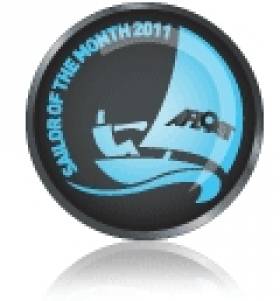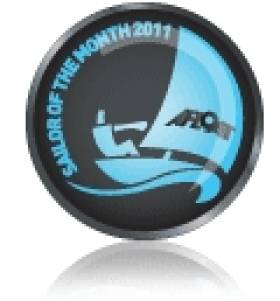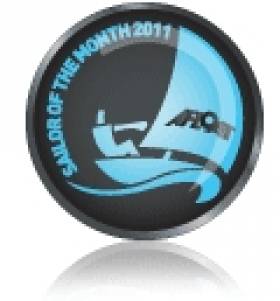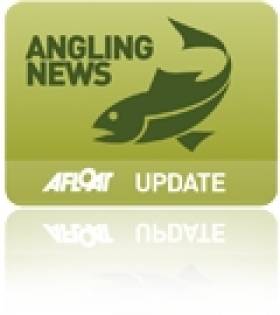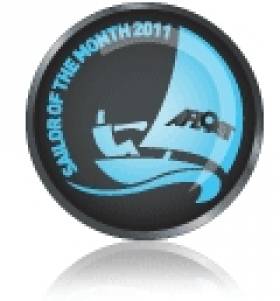Displaying items by tag: Month
Kieran Cotter and Jerry Smith Named Sailors of the Month for August
When Rambler's canting keel snapped off on the evening of Monday August 15th shortly after this mega-machine had rounded the Rock, she was powering at full speed towards the turning buoy, crashing into the lumpy seas which often arise where the steep land juts into the open ocean.
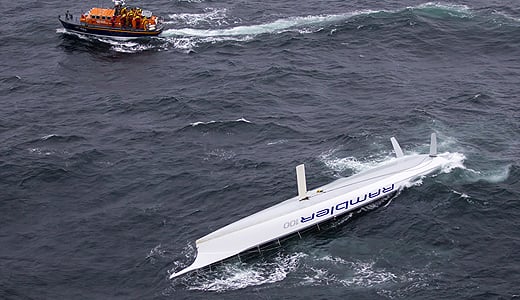
Kieran Cotter and the crew of the Baltimore lifeboat at the capize site. Photo: Thierry Martinez
The catastrophe was total and very sudden. The giant racer completely inverted every bit as quickly as the smallest of racing dinghies. The changeover, from being a highly tuned performer on track for success, into the inverted hell of exploding water, strangling ropes and jagged breaking gear, was at the least totally disorienting, and could have caused panic in less seasoned sailors.
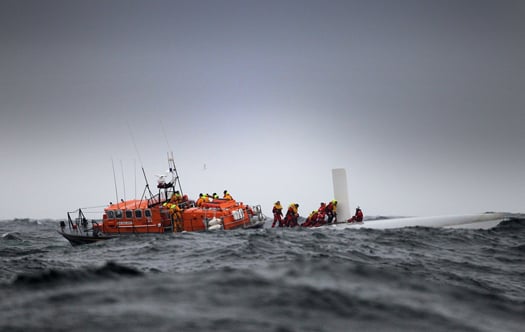
The Lifeboat rescue from the upturned hull. Photo: Team Phaedo
Despite the difficulty of clambering onto the ultra-smooth underside of the huge hull, fifteen of the crew managed to get themselves up to the minimal handhold of the dagger board. But five of those who had been below – some of them off watch asleep – had drifted away from the boat after the monumental struggle of escaping from a small world turned upside down.
The five in the water roped themselves together, but things had taken an ominous turn, as the mist in which the big boat had rounded the Fastnet had now thickened into fog. For a crucial period, visibility was virtually nonexistent as other boat raced past nearby at high speed. And although some emergency radio beacons had automatically activated, the picture was confused with night drawing on.
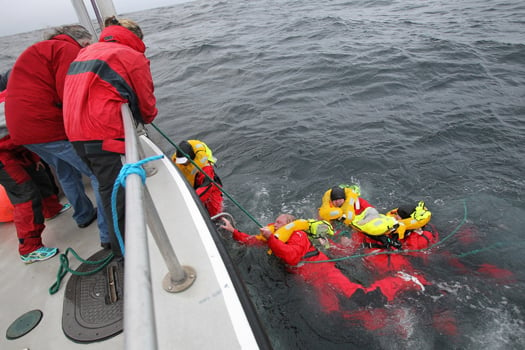
Drifting crew are rescued. Photo: Team Phaedo
Time was of the essence – even in summer these waters can quickly induce hypothermia. Several agencies were now involved in the rescue, and skilled use of technology narrowed the search area, though in the sea conditions the stricken boat and crew were frequently invisible.
It was the Baltimore lifeboat with Kieran Cotter in command which was first on the scene. Taking off the crew was a challenge, but all fifteen on the upturned Rambler were safely rescued, though an impact between lifeboat and white hull resulted in a streak of lifeboat blue on the yacht which was to be immortalised as "Kieran's kiss".
But that was later, not until after a needle-in-a-haystack search found the other five adrift together in the water, with one already on the edge of coma. They were found by the lifeboat deputy mechanic Jerry Smith, on patrol with a Fastnet Race film crew in his dive boat Wave Chieftain. It was a miracle.
Next morning safely in Baltimore, the weather was already well improved. The previous night's conditions seemed like a nightmare. In calm summery conditions two days later, the Rambler hull was righted off Barley Cove and towed to Baltimore. She'll be restored to full racing trim by Cookson's in New Zealand, presumably with modifications to the design and specification for the canting keel. But that's another day's work. Today, we celebrate the achievement of Kieran Cotter and Jerry Smith, whose seamanship provided the successful focus for a network of rapid work by skilled technologists ashore.
Coverage of the rescue appears in Afloat's Rolex Fastnet Race page
Who Will Be July's Sailor of the Month?
June Sailor of the Month - Who's Your Winner?
UK's National Fishing Month Proves Bigger and Better
National Fishing Month is believed to have encouraged over 200,000 new anglers into the sport through the events held over the last 19 years.
This year's event, 16th July to 14th August 2011, has already got off to a wonderful start with Dean Macey adding his endorsement to the initiative.
Dean commented: "I have been fishing for as long as I can remember and where ever I go in the world, I will always bump into someone that also loves fishing. It's such a great hobby - you get to spend time outdoors, appreciate Mother Nature, meet some great people and if you're really lucky, witness some marvelous creatures.
Dean continued: "When I was a kid, I found it hard to get my head around school work or any kind of discipline. If it wasn't for fishing and athletics I dread to think where I would be right now. Between them, they gave me something to focus on and keep me off the streets.
"Throughout my athletics career, fishing helped me mentally unwind and I'm sure without it, I would have burnt myself out. Whether it's a day on the rivers, sleeping under the stars on a still water for a few days or jumping on a plane to fuel my passion abroad, I don't mind. I love it all, and for the most part, I think almost everyone would if given the chance. That's why I support National Fishing Month and urge everyone to get involved and take part. Everyone I have ever taken fishing has loved it and you can't keep them off the bank now. Give it a go, you owe it to yourself!"
As in previous years, the focus is to encourage every family member to have a go at fishing from whatever cultural or social background they may be from. The initiative's timing continues to be deliberately planned to incorporate the end of the school terms and more of the school holidays to enable activities to be linked with both schools and families. Again, by extending the timetable, fishery owners, angling coaches and retailers will have a greater span of time to be able to take part and support events in their areas.
National Fishing Month aims to highlight and celebrate angling, bringing the sport to the attention of the general public, generate positive PR in all forms of media and to encourage would-be anglers of all ages and from all backgrounds to try angling and to take it up as an environmentally based recreation. There will be hundreds of events all over the country organised by coaches from the PAA and the ADB, on behalf of the Angling Trust, independent fishery owners, the Environment Agency, fishing tackle retailers and manufacturers who give their time, their fishery pegs and loads of products for free.
Richard Wightman from the Environment Agency added: "We are really pleased to be able to continue our support for NFM in 2011 and beyond. This year offers a fantastic opportunity in the shape of a prolonged and well-timed Easter, May Bank Holiday, plus the additional Royal Wedding break at the end of April. What better time to help more people get into and stay in fishing. Let's all do what we can to make the most out of it."
If you would like to take part and have a go at fishing, take a look at the events that are already listed on the National Fishing Month website www.nationalfishingmonth.com <http://www.nationalfishingmonth.com> and enter your postcode. The events closest to you will then be listed and you can find out more details from there.
Cruise from Kinvara to Tahiti Wins Sailor of the Month Award
Recognised by the senior offshore sailing organisation, the Irish Cruising Club, with the award of the historic Faulkner Cup, the Quinlan's achievement is further enhanced by the fact that, in their determination to acquire a boat suitable for long distance voyaging, they built their steel-constructed 40ft cutter Pylades themselves, launching in 1997.
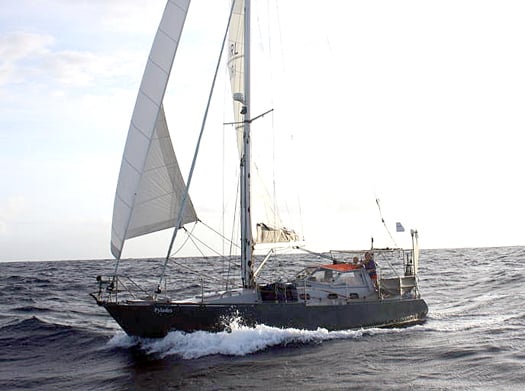
They have brought a lively and enquiring eye to the complex project, something which reflects Fergus's qualifications as an architect. As he has drily observed himself, there isn't a lot of work around for architects in Ireland at the moment, so everything clicked with the boat sea-tested and ready to go off on this sail of a lifetime.
Having left Kinvara in June 2009, their longterm plan is a global circumnavigation, returning to Galway Bay in August 2012. Quite what Ireland will be like by then is anybody's guess. But as it is, the crew of Pylades have enough to be getting on with in dealing with the vagaries of the open ocean, and the volatile political situation in some of the areas where ocean voyagers go. For armchair sailors at home, their thoughtful and entertaining reports on their experiences make them worthy "Sailors of the Month".



























